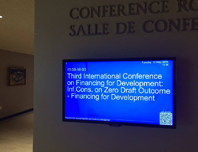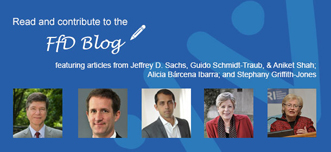With less than two months to go, the countdown is intensifying for the Addis Ababa Conference aimed at securing the resources needed for the well-being of people and the health of our planet. In a joint call, the principals of the organizations behind the event urge world leaders to come to the Ethiopian capital ready to commit to a financing plan which will help us achieve our aspirations to end extreme poverty by 2030.
“This year we can make history by adopting our ambitious and adaptive sustainable development agenda, and a universal climate agreement,” said UN Secretary-General Ban Ki-moon. “But without the right financing and policies we cannot achieve our ambitions; commitments will remain solely words on paper,” he stressed.
“This year we can make history by adopting our ambitious and adaptive sustainable development agenda, and a universal climate agreement”
Ban Ki-moon
UN Secretary-General
Ban Ki-moon’s sentiment is also shared by Wu Hongbo, UN DESA’s Under-Secretary-General and the Conference Secretary-General, who underlined the critical importance of the Third International Conference on Financing for Development which will take place on 13-16 July.
Mr. Wu pointed to the fact that the means and know-how to eradicate poverty do exist. “While public financing, ODA in particular, continues to be very important, public, private, domestic and international sources of finance will need to be part of the equation,” Mr. Wu said. “Globally, capital is plentiful – the financial resources are there, but they must be unlocked, mobilized, channeled, and used more effectively for sustainable development,” he added.
“Wellbeing of billions of people depends on our success”
 Mr. Ban and Mr. Wu were joined in this video message by the principals of the World Bank, IMF, WTO, UNCTAD and UNDP, as well as the Prime Minister of the host country Ethiopia and they all stressed the importance of this upcoming Conference to mobilize the means to achieve a sustainable and prosperous future.
Mr. Ban and Mr. Wu were joined in this video message by the principals of the World Bank, IMF, WTO, UNCTAD and UNDP, as well as the Prime Minister of the host country Ethiopia and they all stressed the importance of this upcoming Conference to mobilize the means to achieve a sustainable and prosperous future.
“History has afforded us the opportunity to make a solemn promise that 15 years from now, we would no more talk of extreme poverty and hunger,” said Ethiopia’s Prime Minister Hailemariam Desalegn, encouraging UN Member States to be represented at the Conference at the highest possible level.
“The wellbeing of billions of people depends on our success,” stressed Jim Yong Kim, President of the World Bank Group. “If we seize this moment, we can accomplish the greatest achievement of human history: we can end extreme poverty in a generation,” he said, also describing the need to find new and innovate ways to leverage development financing and drive private investment to emerging markets.
Christine Lagarde, Managing Director of the IMF, stressed the need for everyone to participate in this joint effort. “We have a collective responsibility, not only to make sure that 2015 is a successful year, but to make sure that 2015 is transformative and improves our future,” she said.
Crucial role of trade to finance sustainable development
“Financing for sustainable development calls for a new 21st century approach to trade and investment issues at large,” said Mukhisa Kituyi, the Secretary-General of UNCTAD.  “Trade and investment play a crucial role in raising domestic resources and creating sustainable opportunities. Even more importantly, trade and investment can transform the structure of poor and vulnerable economies, and provide new value and livelihoods to the impoverished and the marginalized,” he said.
“Trade and investment play a crucial role in raising domestic resources and creating sustainable opportunities. Even more importantly, trade and investment can transform the structure of poor and vulnerable economies, and provide new value and livelihoods to the impoverished and the marginalized,” he said.
Roberto Azevêdo, WTO’s Director-General also underlined the possibility to do more, highlighting their efforts linked to aid-for-trade. “80 per cent of all trade in the world is somehow backed or relies on some type of financing,” he said. “The more vulnerable, the smaller the country, the less access they have to this kind of financing,” he explained. “So we need to do more. […] We’re investing in better global governance and in global growth as a whole,” he said.
“If the Addis Ababa conference on financing goes well, then the prospects of world leaders agreeing on sustainable development goals later this year are good. And so are the chances of achieving those goals over time,” encouraged Helen Clark, UNDP Administrator. “So let’s all work together to make the meeting in Addis Ababa on development financing a very big success.”
“Globally, capital is plentiful – the financial resources are there, but they must be unlocked, mobilized, channeled, and used more effectively for sustainable development”
Wu Hongbo
Conference Secretary-General
 Negotiations continue on outcome document
Negotiations continue on outcome document
Member States are continuing to negotiate the revised draft of the outcome document, the Addis Ababa Accord, which consists of three main sections, addressing: a global framework for financing sustainable development; an action agenda; and data, monitoring and follow-up.
The action agenda is divided into chapters addressing: domestic public resources; domestic and international private business and finance; international public finance; international trade as an engine for development; debt and debt sustainability; addressing systemic issues; and science, technology, innovation and capacity building.
Co-Facilitators George Talbot, Permanent Representative of Guyana, and Geir Pedersen, Permanent Representative of Norway, have convened two additional informal sessions for Member States to review and discuss the outcome document, on 12-15 May and on 26-29 May, with a third session planned for 1-5 June. The final and third drafting session before the Conference will be held on 15-19 June.
Financing for development blog launched
Outlining the six financing priorities for Addis and the reason why 2015 is key for sustainable development – these are some of the topics for a new blog series just launched on the Conference website. The blog highlights and brings together a variety of perspectives and recommendations on all issues on the agenda for the Conference.
Featured in the launch of this series are blog posts by Stephany Griffith-Jones, Financial Markets Program Director at the Initiative for Policy Dialogue at Columbia University; Jeffrey D. Sachs, Guido Schmidt-Traub, and Aniket Shah, Sustainable Development Solutions Network; and Alicia Bárcena Ibarra, Executive Secretary, UN Economic Commission for Latin America and the Caribbean.
Preparations for the Conference will now enter into its final stretch under the leadership of Mr. Wu, who urges everyone to step up to the plate. “World leaders must rise to the challenge. All together we must show our determination and commitment to invest ahead for people and the planet.”

